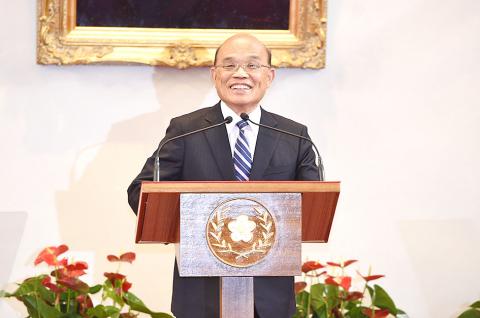Former premier Su Tseng-chang (蘇貞昌) is to be sworn in as the new premier on Monday, President Tsai Ing-wen (蔡英文) said yesterday.
The appointment came in the wake of the Democratic Progressive Party’s (DPP) heavy losses in the Nov. 24 local elections, which led to Tsai’s resignation as party chairperson and the Cabinet’s mass resignation on Thursday.
At a news conference at the Presidential Office in Taipei, Tsai said that she asked Su to take the role as he possesses three characteristics the nation needs at this moment: experience, boldness and the ability to get things done.

Photo: George Tsorng, Taipei Times
Su’s philosophy of “breaking new ground” was evidenced by his campaign last year for the mayorship of New Taipei City through his employment of young campaign employees, innovative policymaking or creativity in promotions, she said.
In addition to fulfilling its promise to “make Taiwan great,” the administration would from now on focus more on equitable distribution of public resources and caring for disadvantaged people, Tsai said.
The nation is facing numerous challenges this year, including a US-China trade dispute and Chinese President Xi Jinping’s (習近平) proposal to introduce a Hong Kong-style “one country, two systems” formula for Taiwan, she said.
“This is a year for us to strive to improve people’s lives, defend democracy and safeguard our sovereignty,” she said.
Tsai said that she would work closely with Su, whose decades of experience would enable him to lead with conviction as they help the nation navigate ever-changing international situations.
She extended her gratitude to outgoing Premier William Lai (賴清德) for his “pragmatic” approach that has helped the government achieve many of its goals in terms of reform and development.
“This is a daunting task at a critical moment,” Su said, thanking Lai for his team’s outstanding governance, which has laid the groundwork for Su’s team.
He added that he would strive for even greater achievement.
Citing a quotation often misattributed to former British prime minister Winston Churchill, Su said: “Success is not final, failure is not fatal.”
Churchill during World War II led the UK through its darkest hours, and after the war he again served as leader to the great acclaim of Queen Elizabeth II and the public, despite his age, said Su, who is 71.
“I shall roll up my sleeves and lead my team to meet the public’s expectations and bring the government in sync with public opinion,” he said.
Comparing himself to a “middle relief pitcher” for the DPP and Su as the “closer,” Lai praised Su’s “invaluable” experience and wished him good luck.
Later yesterday, former Taichung mayor Lin Chia-lung (林佳龍), who lost his re-election bid in last year’s elections, said on Facebook that he has accepted Su’s offer to serve as minister of transportation and communications.
The Chinese Nationalist Party (KMT) caucus ridiculed Su, Lin and another potential Cabinet member, former DPP legislator Chen Chi-mai (陳其邁), for their unsuccessful campaigns last year, calling them a “union of losers” and members of a “DPP veterans’ affairs council.”
Additional reporting by Chen Yun

CHAOS: Iranians took to the streets playing celebratory music after reports of Khamenei’s death on Saturday, while mourners also gathered in Tehran yesterday Iranian Supreme Leader Ayatollah Ali Khamenei was killed in a major attack on Iran launched by Israel and the US, throwing the future of the Islamic republic into doubt and raising the risk of regional instability. Iranian state television and the state-run IRNA news agency announced the 86-year-old’s death early yesterday. US President Donald Trump said it gave Iranians their “greatest chance” to “take back” their country. The announcements came after a joint US and Israeli aerial bombardment that targeted Iranian military and governmental sites. Trump said the “heavy and pinpoint bombing” would continue through the week or as long

TRUST: The KMT said it respected the US’ timing and considerations, and hoped it would continue to honor its commitments to helping Taiwan bolster its defenses and deterrence US President Donald Trump is delaying a multibillion-dollar arms sale to Taiwan to ensure his visit to Beijing is successful, a New York Times report said. The weapons sales package has stalled in the US Department of State, the report said, citing US officials it did not identify. The White House has told agencies not to push forward ahead of Trump’s meeting with Chinese President Xi Jinping (習近平), it said. The two last month held a phone call to discuss trade and geopolitical flashpoints ahead of the summit. Xi raised the Taiwan issue and urged the US to handle arms sales to

State-run CPC Corp, Taiwan (CPC, 台灣中油) yesterday said that it had confirmed on Saturday night with its liquefied natural gas (LNG) and crude oil suppliers that shipments are proceeding as scheduled and that domestic supplies remain unaffected. The CPC yesterday announced the gasoline and diesel prices will rise by NT$0.2 and NT$0.4 per liter, respectively, starting Monday, citing Middle East tensions and blizzards in the eastern United States. CPC also iterated it has been reducing the proportion of crude oil imports from the Middle East and diversifying its supply sources in the past few years in response to geopolitical risks, expanding

OTHER OPTIONS: Given possible US intervention and Taiwanese counterattacks, China might opt to blockade Taiwan or take its outlying islands instead of an all-out invasion A US think tank has urged Taiwan to adopt a “hellscape” strategy that would flood the Taiwan Strait with drones and other uncrewed systems to deter invasion by China. In its report, Hellscape for Taiwan, published on Thursday, the Center for a New American Security said Taipei’s asymmetric defense approach — often described as a “porcupine strategy” — needs to evolve to keep pace with the growing capabilities of the Chinese People’s Liberation Army. The “hellscape” strategy involves saturating the air and waters around Taiwan with thousands of drones and other platforms capable of striking invading forces from multiple domains at once. Long-range